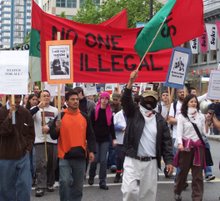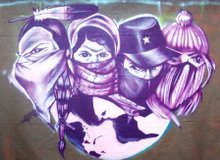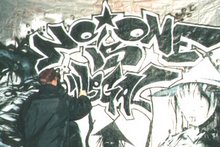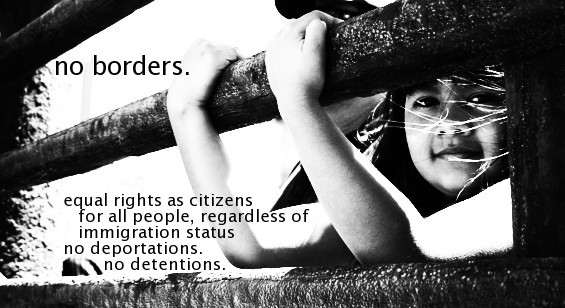The Nakba has Never Ended Julia Pitner, The Electronic Intifada, 15 May 2007
With the celebration of Israel's 59th year of independence comes the mourning of the 59th year of what the Palestinians call Al-Nakba -- the disaster. Israel celebrated its Independence this week by "locking down" the Palestinians in their towns and villages through the total closure of all checkpoints encircling major Palestinian population centers. This year, the Palestinians will remember their nearly six decades of dispossession by marking the expulsion of vast majority of the people; splitting up of families; and the creation of hundred's of thousands of refugees, many of whom remain refugees today. They will remember the villages that no longer exist and the family farmlands that are now Israeli cities, shopping malls, forests, farms, and highways, places that Palestinians are not even allowed to visit. But those who remain in Palestine will also remember that they are still here, and they will swear that they will never again be forced to leave their lands and families. But this is a difficult oath to keep, not only because of IDF brutality, but also because of the structural, systematic violence of Israeli bureaucracy.
The sad truth is that while the Palestinians commemorate the Nakba of 1948, the disaster is ongoing up until today. Now, however, the oppression is subtler than the forced marches of the citizens of Ramla, the forced exodus of hundreds of thousands, or those who fled from violence or from the fear and confusion about what the Jewish militias were threatening or the Arab governments promising. It is a slow, forced exodus that is not exciting enough to warrant any airtime or column space. We are witnessing the slow but sure strangulation of Palestinian culture and existence in their homeland through Israeli bureaucratic policies and strategies. Palestinians are a people being squeezed to death, not only by a wall that cuts off farmers from their ancestral lands and splits families in two, but also by a system of paper, permits, proof, and permissions.
(Click here to read more)
skip to main |
skip to sidebar







Vancouver - Occupied Coast Salish Territories noii-van@resist.ca / 604-682-3269 ext.7149 www.nooneisillegal.org

Blog Archive
-
▼
2007
(422)
-
▼
May
(47)
- Campout and Rally in Support of Iraj Ghahramani
- Deportation looms for Vancouver's 'Dancing Santa
- Urgent Appeal to Support Iraj Ghahramani
- Why Canadians side with militant Indians
- Honduras to US: Stop Deportations
- Collateral Genocide
- Depleted Uranium - The US Army has contaminated Ha...
- 100 suspected illegal workers arrested
- Immigration Raid Leaves Sense of Dread in Hispanic...
- Iraqi refugees overwhelming Syria
- Feds crack down on immigrant labor organizers
- Bipartisan Senate plan would deepen exploitation o...
- U.S. town opposes "Big Brother" Mexico border fence
- Letter to Black America on Palestinian Rights
- The new sanctuary movement
- Women Raise Heat on Immigration Debate
- WTO blamed for India grain suicides
- One Billion To Be Displaced By 2050
- Social Change and Building the Ties That Bind
- General Strike Paralyzes Pakistan
- Delivering 'Framed' John Graham
- Special Economic Zones - Neoliberal "Enclosures" I...
- Under-reported Indigenous Struggles
- The Nakba has Never Ended
- Challenges for the New Sanctuary Movement
- Canada to launch no-fly list in June
- Public Terror: Escalating the War on Migrants
- Haitian Refugees: Capsized Boat Deliberately Overt...
- Tigris River becoming a graveyard of bodies
- Barrick Boss Gets Served
- Protests in Germany over raids
- Trademarking Coffee: Starbucks cuts Ethiopia deal
- Feminism Then and Now
- Rebuilding Resistance in Lebanon
- Zapatismo & Queer Struggles
- Mohawks and Ottawa: More Than a Mine, A Metaphor
- Around Globe, Walls Spring Up To Divide Neighbors
- Mayday Immigrant Rights are Worker Rights
- IMF And World Bank Face Declining Authority As Ven...
- Two Chinese Foreign Workers Dead in Alberta
- Role of Settlers in Indigenous Struggles
- Azmi Bishara: Why is Israel After Me
- The Revolution Will not be Funded
- Mining Company Barrick's Dirty Secrets Worldwide
- Barack Obama, Corporate Candidate
- The Migrant Trap
- Multiculturalism Kills Me
-
▼
May
(47)
Labels
- Afghanistan (21)
- Africa (25)
- Anti-Oppression (15)
- Australia (8)
- Canada (105)
- Corporate Globalization (45)
- East Asia (9)
- Environment and Health (26)
- Europe (25)
- Gender (42)
- GLBTQ (7)
- Haiti (9)
- Immigrant/Refugee/Nonstatus (154)
- Imperialism (51)
- Incarceration (63)
- Indigenous (57)
- Iraq (54)
- Labour (34)
- Latin America (41)
- Media (3)
- Middle East (28)
- Palestine (42)
- Police Brutality (4)
- Poverty (17)
- Racism (58)
- Security (67)
- Somalia (7)
- South Asia (25)
- SPP (2)
- US Abroad (91)
- US Home (160)

About Us
No One is Illegal-Vancouver is a grassroots anti-colonial immigrant/refugee rights community collective with leadership from members of migrant and/or racialized backgrounds.
As a movement for self-determination that challenges the ideology of immigration controls, we are in full confrontation with Canadian border policies; denouncing and taking action to combat racial profiling, detention and deportation, the national security apparatus, law enforcement brutality, and exploitative working conditions of migrants. We stand in solidarity with indigenous struggles against colonization across Turtle Island and also place ourselves within the broader movement for global justice struggling against capitalism, homophobia, occupation, patriarchy, poverty, war, and other systems of oppression and exploitation.





No One Is Illegal - Vancouver
Our educational work involves furthering an anti-imperialist, anti-war, and anticapitalist analysis that links the "War on Terror" abroad to the racist "Fortress North America" at home. We struggle for the right for our communities to maintain their livelihoods and resist war, occupation, and displacement, while building alliances and supporting indigenous sisters and brothers fighting theft of land and displacement.
Our work is carried out through various strategies including public awareness events, direct support work with refugees and undocumented migrants, multilingual community political/legal forums, fighting back through rallies and direct actions, and ongoing campaigns and projects.